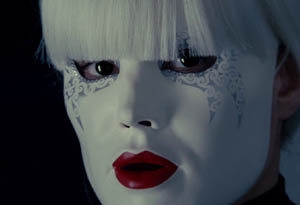|
Oh, Brian De Palma, you crazy nut, you're doing that thing again! And that other thing, and those other ones; you know, those things you do that you've kind of always done, which some people inarguably do like, and which some others don't, such as most people going to the movies in the current millennium, a fact which might explain why Passion slunk quietly through theaters like a man dodging an insurance audit. I actually rather enjoyed it, mostly after a week or so of reflection, which might be asking a bit much of the average viewer, who wants to know whether or not he or she likes a film a tad sooner and doesn't have time for all that contemplative shit. 
Passion is a remake of the French film Love Crime, though there are numerous added bits and one significant structural shift. Based on that simple description, it wouldn't be at all hard for anyone remotely familiar with De Palma's body of work to pick out just which bits were new to this interpretation: mysterious twin sisters who may or may not be real (or dead), killers in creepy masks, lesbians, dream sequences, split screens, voyeurism, etc. De Palma's idea of what constitutes a thriller was more or less fixed in the 1970s and hasn't changed appreciably in the meantime; whether this constitutes artistic stagnation or committment to personal vision depends largely, in the end, upon whether you like the film or not. In the ladder-climbing world of corporate advertising culture, an executive and her assistant attempt to concoct an eye-catching ad campaign for a new cell phone. The assistant, Isabelle, cracks it, but her boss Christine usurps the credit, assuring her employee that it's merely good business. Initially, if grudgingly, accepting of this rationalization of such betrayal, Isabelle grows increasingly rankled when the higher-ups consider diluting her original vision, and what follows is an escalating spiral of one-upmanship as the two women fight for control and, ultimately, sheer personal victory. Isabelle is quiet and introverted, teetering on the brink of emotional implosion at times, whereas Christine is all brightness and charm, albeit of a completely plastic variety, like a high school class president playing grown-up and still seeing supporters as mere potential votes instead of actual friends. Before all's said and done, there's a murder, and things only get crazier from there. 
This is all ridiculous of course, flamboyant and lurid in its over-the-top theatricality, but not without a certain charm. The original French film had that aloof quality so often found in European cinema; while the plot was almost identical, Passion could scarcely be more different in overall tone. In spite of the rather leading title Love Crime, any affection between the two leads in that film was very subtextual. De Palma, on the other hand, lives up to his reputation of thoroughly disdaining subtlety. The original poster image was of the two women's faces in profile, glimpsed through a nearly-closed elevator door, leaning in as if for a kiss, which sends a not-entirely accurate message. Sexual orientation, for both women, seems an arbitrary issue, as if bedding another human being was just another conquest, questions of gender be damned. Indeed, when the kiss finally comes, it's one of the most aggressive, unaffectionate, "I'm really saying 'fuck you'" kisses ever put to screen. Anyone coming here in search of titillating girl-on-girl action is probably best served elsewhere. 
One thing De Palma hasn't forgotten how to do is reveal information in a clever way; in these areas Passion rises above the more straightforward structure of its source material, which took a more simplistic and blunt approach to certain plot revelations that are now not only more logical, but contribute more to the tension. Clues are doled out in ways such that they don't look like clues on the first go-around (one key sequence, for example, hinges on what the film isn't showing you). Of course, it's also more trashy and melodramatic, which may have fans of the original crying foul (although it's nothing akin to the man's earlier works in this regard; you simply could not make a movie like Dressed to Kill in this day and age, especially if you wanted A-list actresses in the starring roles), and in a few ways its casting works less effectively than Love Crime's. Can we really buy that Noomi Rapace, the woman who portrayed Lisbeth Salander, is going to stand for being treated as a doormat? This is not the sort of movie that they tend to make anymore, which might go some ways towards explaining its less-than-warm reception, but surprisingly, to me, anyway, even De Palma's faithful have been less than kind to this film, which in the end I found I liked quite well. It's true that there's little new to see here, and it's true that in a few places the film seems as though it's being less than honest with the audience, and, of course, it's true that the director has already pulled that particular ending trick off twice before. I'd argue, however, that for once what previously struck me as a cheap shot works better here than in his previous attempts; the sudden double-twist that occurs in the film's final moments graphically illustrates our protagonist's inner state far better than any laden exposition could. It just takes a bit of rumination after the fact; I'd say it was worth the effort. -review by Matt Murray
|
|
||||||||